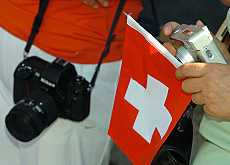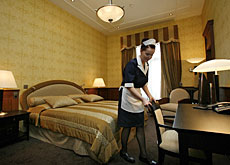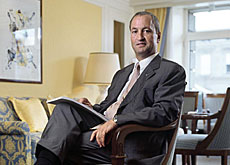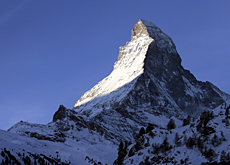“Polite” Swiss come third in tourist study

The Swiss have been voted the third-most popular tourists in the world, behind those from Japan and the United States, in a survey of hoteliers across Europe.
Swiss tourists were commended for being quiet and considerate – unlike Britons, who came fifth from bottom in the poll because of rude behaviour, noise and a miserly attitude to tipping.
Japanese tourists stood out for being polite and tidy, securing 65 per cent of the votes, 35 per cent more than those from the US, who came second despite being considered loud.
But according to the study, which was published on Wednesday, tourists from the United States gained points for attempting to speak the local language and always trying local food – in addition to spending a lot of money during their stays.
Swiss tourists attracted 18 per cent of votes – seven per cent ahead of the Swedes.
Based on responses from 15,000 European hoteliers, the survey carried out on behalf of travel website Expedia showed that the worst tourists were the French – who refused to speak foreign languages or try local specialities – followed by the Indians, Chinese and Russians.
US tourists were considered the worst-dressed and the Germans were the least-generous. This perceived tightness was the reason the Germans dropped from pole position in 2002 to fifth in 2007.
Swiss mentality
Peter Brun from Swiss travel company Kuoni told swissinfo that he wasn’t surprised by the result.
“We’re nice people!” he said. “It could be because we’re from a small country and we sometimes feel a bit like the underdog – maybe it’s just our mentality.”
Brun confirmed that the most popular destinations for Swiss tourists remain Greece and Spain.
“It’s such as big area – in Spain you have the Canary Islands, the mainland and the Balearics,” he said, adding that sun is obviously also an attraction. “The Mediterranean way of life is always very popular.”
In 2003 the Swiss made 21.8 million trips with overnight stays. Of those trips 47 per cent were abroad and nearly nine out of ten were in Europe.
Boom
As for tourists within Switzerland, the Swiss tourism industry thanked the bullish global economy and weak franc for its 34.8 million overnight stays in 2006 – up 5.8 per cent on 2005.
According to a report by the Federal Statistics Office released in February, the sector’s best figures since 2000 comprised 18.3 million foreign stays, up 7.2 per cent, and 14.6 million Swiss stays, up four per cent.
The biggest market for Switzerland remains the Swiss themselves itself, then the Germans and then the British.
There has also been a boom in tourists from the so-called BRIC nations – Brazil, Russia, India and China. The Swiss government announced in December it was focusing economically on these states.
The number of nights spent in Switzerland by Russian tourists rose by 18.7 per cent to 328,000. The figure for Indian tourists was 284,000 (up 14.2 per cent), for Chinese tourists 205,000 (up 19.5 per cent) and for Brazilian tourists up 24.4 per cent to 128,000.
swissinfo
Swiss tourism has its origins in the 19th century and flourished until the First World War. It then suffered a downturn due to the economic crisis and the Second World War.
The sector recovered during the post-war era, as Switzerland did not suffer any war damage. The boom lasted until the end of the 1980s. After a difficult 1990s, the sector is seeing an upturn.
The Swiss tourism industry generates around SFr22.8 billion ($18.2 billion) a year, around 5.1 per cent of gross national product. More than half comes from foreign tourists.
According to Hotelleriesuisse, the hotel sector’s turnover is around SFr8.6 billion a year, with 33 million overnight stays annually.
Tourism in Switzerland employs 250,000 people.
According to the World Economic Forum (WEF), travel and tourism is one of the world’s largest economic activities.
In 2006 the sector generated 10.3% of world gross domestic product, providing 234 million jobs or 8.2% of total world employment.
According to the World Tourism Organization (UNWTO), the number of international arrivals grew from 25 million in 1950 to an estimated 763 million in 2004 – an average annual growth rate of 6.5%.

In compliance with the JTI standards
More: SWI swissinfo.ch certified by the Journalism Trust Initiative



You can find an overview of ongoing debates with our journalists here. Please join us!
If you want to start a conversation about a topic raised in this article or want to report factual errors, email us at english@swissinfo.ch.